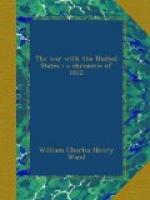All these peculiar influences are reflected in the different patriotic annals. Americans are voluble about the Lakes and the naval duels out at sea. But the completely effective British blockade of their coast-line is a too depressingly scientific factor in the problem to be welcomed by a general public which would not understand how Yankee ships could win so many duels while the British Navy won the war. Canadians are equally voluble about the battles on Canadian soil, where Americans had decidedly the worst of it. As a rule, Canadian writers have been quite as controversial as Americans, and not any readier to study their special subjects as parts of a greater whole. The British Isles have never had an interested public anxious to read about this remote, distasteful, and subsidiary war; and books about it there have consequently been very few.
The two chief authors who have appealed directly to the readers of the mother country are William James and Sir Charles Lucas. James was an industrious naval historian; but he was quite as anti-American as the earlier American writers were anti-British. Owing to this perverting bias his two books, the Naval and the Military Occurrences of the late War between Great Britain and the United States, are not to be relied upon. Their appendices, however, give a great many documents which are of much assistance in studying the real history of the war. James wrote only a few years after the peace. Nearly a century later Sir Charles Lucas wrote The Canadian War of 1812, which is the work of a man whose life-long service in the Colonial Office and intimate acquaintance with Canadian history have both been turned to the best account. The two chief Canadian authors are Colonel Cruikshank and James Hannay. Colonel Cruikshank deserves the greatest credit for being a real pioneer with his Documentary History of the Campaigns upon the Niagara Frontier. Hannay’s History of the War of 1812 shows careful study of the Canadian aspects of the operations; but its generally sound arguments are weakened by its controversial tone.
The four chief American authors to reckon with are, Lossing, Upton, Roosevelt, and Mahan. They complement rather than correspond with the four British authors. The best known American work dealing with the military campaigns is Lossing’s Field-Book of the War of 1812. It is an industrious compilation; but quite uncritical and most misleading. General Upton’s Military Policy of the United States incidentally pricks all the absurd American militia bubbles with an incontrovertible array of hard and pointed facts. The Naval War of 1812, by Theodore Roosevelt, is an excellent sketch which shows a genuine wish to be fair to both sides. But the best naval work, and the most thorough work of any kind on either side, is Admiral Mahan’s Sea Power in its Relations to the War of 1812.




